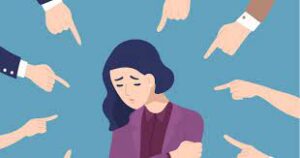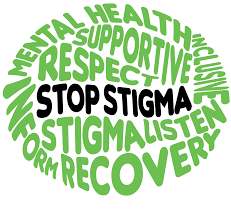According to the National Alliance on Mental Illness (NAMI), one in five American adults experiences a mental illness in any given year. Despite this, mental illness is often viewed as a taboo topic, and those who suffer from it are often met with discrimination and stigma. This has to change. In this blog post, we will discuss the effects of stigma and discrimination against those with mental illness, and how we can work together to end it.
Contents
How Stigma And Discrimination Relate To Mental Illness?
 Stigma is characterized by a lack of understanding, fear, and prejudice towards mental illness. It can result in people with mental health conditions being treated differently or unfairly.
Stigma is characterized by a lack of understanding, fear, and prejudice towards mental illness. It can result in people with mental health conditions being treated differently or unfairly.
Discrimination against people with mental illness can take many forms. It can be overt, like name-calling, teasing, or making negative comments about someone with a mental health condition. It can also be subtle, like avoiding or excluding someone from social activities.
Both stigma and discrimination can lead to social isolation and exclusion. They can also make it difficult for people to get the treatment and support they need.
Researchers have identified stigma and discrimination as some of the main barriers to mental health care. In order to address these barriers, it is important to increase public awareness and understanding of mental illness. It is also important to challenge the negative attitudes and behaviors that contribute to stigma and discrimination.
Types Of Stigma And Discrimination
According to study findings, there are three types of stigma and discrimination that people with mental illness face:
Public Stigma
This is when the general public has negative attitudes towards people with mental illness. This can lead to discrimination in areas like employment, housing, and access to services. Public stigma can also make it harder for people to seek help and treatment.
Self-Stigma
It is when a person with mental illness starts to believe the negative stereotypes about themselves. This can lead to social isolation and make it harder for a person to seek help and treatment.
Structural Stigma
 This is when society has systems in place that discriminate against people with mental illness. For example, employment laws make it hard for people with mental illness to get jobs or health insurance laws that don’t cover mental health care. It is often hard for people with mental illness to get the help they need because of structural stigma.
This is when society has systems in place that discriminate against people with mental illness. For example, employment laws make it hard for people with mental illness to get jobs or health insurance laws that don’t cover mental health care. It is often hard for people with mental illness to get the help they need because of structural stigma.
These are the three stages that one can experience during sufferings from mental illness. It is important to understand these stages in order to help end the stigma and discrimination of mental illness.
However, stigma not only affects an individual, in fact, it also has an impact on the family, friends, and loved ones. In order to end the stigma, it is important to educate yourself and others about mental illness.
It is also important to speak up when you see someone being discriminated against. Only by working together can we end the stigma and discrimination of mental illness.
Negative Impacts Of Stigma And Discrimination
Stigma and discrimination can have a number of negative impacts on people living with mental illness. In fact, this condition has worsening symptoms. According to research, it is less likely to have treatment options.
However, there is something we can do to end the stigma and discrimination against mental illness. By doing things to help, we can make a difference in the lives of many people.
- feeling isolated and alone
- being treated differently or unfairly
- having difficulty finding employment or housing
- experiencing violence or abuse
- being denied access to healthcare and other services.
It is important to remember that stigma and discrimination are often based on ignorance and fear. And they are not indicative of the reality of living with mental illness.
There is one study held in 2007, that includes individuals more than 200 with mental illness. It was found that more than 90% of them have experienced stigma and discrimination in their lifetime. It is not only a problem in the United States but all around the world.
How To Identify Stigma And Discrimination?

It is important to be able to identify stigma and discrimination against mental illness so that we can effectively address it. Here are some key signs:
- Treating people with mental illness differently or unfairly.
- Avoiding or excluding people with mental illness.
- Making assumptions or judgments about people with mental illness.
- Expressing negative attitudes or beliefs about people with mental illness.
- Refusing to acknowledge the existence of mental illness.
- Blaming people with mental illness for their condition.
If you notice any of these signs in yourself or others, it is important to take action. Stigma and discrimination can have a serious impact on the lives of those affected by mental illness, and it is crucial that we work together to end it.
A recent survey in the year 2020 has shown unexpected results. According to that, the children in the age group of 14-22, were found to have 90 percent of mental illness. The symptoms of depression, anxiety, and mental health issues.
The reason can be anything such as social media pressure, studies, parents’ expectations, or anything else. As we all are well aware of the fact that children nowadays are very much exposed to social media. And through that, it is noticed that young adults and teenagers are searching for mental illness online. In fact, many of them are sharing their stories over social media platforms.
How To End The Stigma And Discrimination?
It’s time to end the stigma and discrimination of mental illness. Mental illness is a real and serious issue that should be treated with the same care and concern as any other medical condition.
Unfortunately, mental illness is often met with skepticism, judgment, and even ridicule. This needs to change. And for that, there are various things we can do:
Talk About It Openly
This is important when it comes to breaking the stigma and discrimination of mental illness. When we talk about it openly, we can help others understand that it’s nothing to be ashamed of. It doesn’t make someone weak or less than.
We should talk about the stigma and discrimination of mental illness the same way we talk about racism or sexism. It’s an issue that needs to be addressed. And, without any shame, we have to be honest about our experiences with mental illness. Make the things relaxed and easy to digest, so that people can slowly but surely open up about them.
Educate Yourself And Others
 Many times, the stigma and discrimination of mental illness come from a lack of understanding. People are afraid of what they don’t know. So, it’s important to educate yourself and others about mental illness.
Many times, the stigma and discrimination of mental illness come from a lack of understanding. People are afraid of what they don’t know. So, it’s important to educate yourself and others about mental illness.
This way, you can better understand it and help others do the same. There are plenty of resources available, so there’s no excuse to learn more about it. There are many great books, articles, blogs, and websites that provide information about mental illness. The more people know about it, the less fearful they’ll be.
Encourage Equality
We need to start treating people with mental illness the same way we do with normal, everyday people. They should be given the same opportunities, rights, and respect. We need to see them as equals.
This means that we shouldn’t make assumptions or judgments about someone based on their mental illness. We also need to stop using offensive language when referring to mental illness. And finally, we should start speaking up when we see others being treated unfairly because of their mental illness.
Show Compassion
People with mental illness are just like everyone else. They’re human beings who deserve our compassion and understanding. So, the next time you see someone struggling, take a moment to reach out and offer your support.
You don’t have to be a professional or have all the answers. Sometimes, just being there for someone can make all the difference in the world. It is important to understand, the stigma and discrimination already make the life of a mentally ill person hard enough, and we need to do our part in making it just a little bit easier.
If we all work together, we can end the stigma and discrimination of mental illness once and for all. It’s time to open up the conversation and create a more understanding and compassionate world for everyone.
Get Treatment
Getting treatment for this mental illness is the key to success. It can be extremely difficult to overcome mental illness without professional help. So, if you or someone you know is struggling, don’t hesitate to get treatment.
There’s no shame in getting help. In fact, it’s one of the bravest things you can do. And with treatment, recovery is possible.
For that matter, there are various types of treatment as per the need like- medication, therapy, support groups, and self-care techniques. But it is very important to consult a professional before taking any kind of step further. They can guide you according to your requirement and suitability.
Take Care Of Yourself
 It’s important to take care of yourself, both physically and mentally. Because it is not going to be easy to end the stigma and discrimination of mental illness if we don’t take care of our own health first. So, make sure to eat healthy, exercise, get enough sleep, and do things that make you happy.
It’s important to take care of yourself, both physically and mentally. Because it is not going to be easy to end the stigma and discrimination of mental illness if we don’t take care of our own health first. So, make sure to eat healthy, exercise, get enough sleep, and do things that make you happy.
And finally, don’t forget to be patient. Change doesn’t happen overnight. But, if we all do our part, eventually, we can create a world that’s more understanding and accepting of mental illness. Together we can end the stigma and discrimination against mental illness once and for all.
Never ignore the warning signs of mental illness. It’s important to get help as soon as possible. The sooner you get treatment, the better your chances are for a full recovery.
Conclusion
Ending the stigma and discrimination against mental illness is important for many reasons. It can help people feel more comfortable seeking treatment, lead to earlier diagnosis and intervention, and reduce the overall cost of mental health care.
But most importantly, it can save lives. Because people suffering from mental illness are more likely to die by suicide than the general population. And stigma and discrimination can be major barriers to seeking help. Therefore, reducing these factors can have a profound impact on public health.
By increasing our understanding of mental illness and its causes. We can hope to change attitudes and reduce the negative effects that these attitudes have on people’s lives.
A Word From Therapy Mantra
Your mental health — Your psychological, emotional, and social well-being — has an impact on every aspect of your life. Positive mental health essentially allows you to effectively deal with life’s everyday challenges.
At TherapyMantra, we have a team of therapists who provide affordable online therapy to assist you with issues such as depression, anxiety, stress, workplace Issues, addiction, relationship, OCD, LGBTQ, and PTSD. You can book a free therapy or download our free Android or iOS app.


